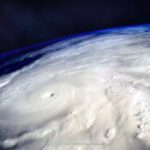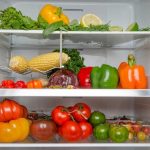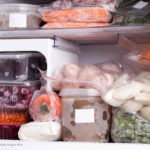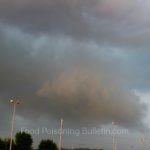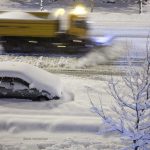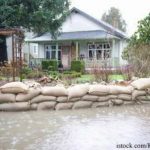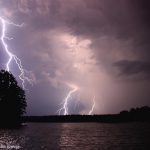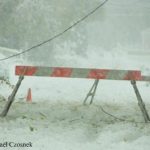Get food safety emergency preparedness tips before a storm from the USDA. September is National Food Safety Education Month and emergency Preparedness Month. And with Hurricane Helene bearing down on the southeastern United States, it's time to get ready. For a chart about how to prepare, see Food Safety Before An Emergency. Knowing how to keep your food and water safe will minimize danger from spoiled food and reduce the risk of foodborne illness. It's a good idea to always be ready, but when a storm watch or warning is issued, start to prepare. First, fill empty spaces in your freezer with frozen plastic jugs of water or bags of ice. They can serve as fresh water as needed. And freeze items you don't need right away. Fill jugs with fresh water and fill your bathtub as well. … [Read more...]
Stay Food Safe During Temporary Power Outages With USDA Tips
Did you know that weather-related power outages have increased by 67% since 2000? Aging infrastructure and climate change are stressing our power grid. Because of the increased energy demand, some power grids can experience blackouts. And of course, severe weather can cause extended power outages. Brownouts can also occur when electric providers ask consumers to voluntary conserve energy or a reduced flow of electricity will be scheduled. So learn how you can stay food safe during temporary power outages. To stay food safe, always keep and appliance thermometer in both your refrigerator and freezer to make sure that the temperature stays below 40°F in the fridge and below 0°F in the freezer. Food will stay at a safe temperate run the fridge up to four hours during a power outage. In … [Read more...]
Are You Ready For a Hurricane? Get Tips From the FDA
Are you ready for a hurricane? With the news of Tropical Depression Fred wreaking havoc on the east coast, and Tropical Storm Henri on the horizon, now is the time to prepare if you live in a hurricane zone. These tips apply across the country in any type of severe weather. The FDA has great tips and information you need to know. These storms can cut off water supplies and threaten the food supply. Before a storm, make sure you have thermometers in your refrigerator and freezer, and stock up on coolers, frozen gel packs, and dry ice to keep reefrigerated food at or below 40°F and frozen food at or below 0°F if you lose power. And stock up on bottled water and nonperishable food and put it as high up on shelves as you can in case of floods. Also make sure you have a manual can opener … [Read more...]
Don’t Put Frozen Food Outside During Power Outages Even if it’s Cold
There are major power outages in large swaths of the United States as a result of freezing temperatures and severe weather, and some bad food safety advice is circulating. When it's cold outside and you are worried about frozen food thawing and spoiling, you may be tempted to put the food outside to keep it frozen. That's a bad idea. Don't put frozen food outside. Even if there's snow on the ground and icicles hanging from your roof, outside temperatures can vary wildly. Frozen food is only safe if it stays below 0°F. Snow and ice will be present on the ground until the air temperature gets above 32°F, and even warmer temperatures than that. This fluctuation can cause thawing and freezing in your frozen food, causing loss of quality and perhaps even the growth of pathogenic … [Read more...]
Keeping Food Safe During Severe Storms and Hurricanes
Hurricane season is here, and while the summer severe weather season is slowing down in the rest of the country, power outages and severe storms are common in the fall and winter. The USDA offers the Consumer's Guide to Food Safety during severe storms and hurricanes. The key to keeping food safe at any time of the year and during any severe weather event is preparation. Keep up to date on watches and warnings and start getting ready as far in advance as you can. First, keep an appliance thermometer in your fridge and freezer. The freezer should be set at 0°F, and the fridge should be set at 34 to 39°F. Freezers work best when they are at least half full. Group foods together in the freezer to help the food stay cold longer. It's a good idea to freeze container of water both … [Read more...]
Prepare For Food Safety During Power Outages WIth Tips From the FDA
As the U.S. enters the hurricane and tornado season, the FDA is offering tips for helping consumers prepare for food safety during power outages. Food can spoil if the power is out for hours, but you can save money and protect yourself by following these steps. First, make sure that you have appliance thermometers in your refrigerator and freezer. That's the best way to tell if the temperature in those appliances is cold enough to keep food safe from bacterial growth. The freezer should always be at 0°F or below, and the refrigerator should always be at or below 40°F. Then, think about freezing containers of water to help keep foods cold in the freezer, refrigerator, or coolers when the power goes out. The melting ice will also provide drinking water if you use water from the … [Read more...]
USDA Offers Advice for Those Affected by Winter Storm
Winter storm Stella is hitting the northeastern United States. The USDA has food safety tips to keep in mind when you are preparing for a severe weather emergency. Many people think that storing food outside when it's cold is safe, but it isn't. Outdoor temperatures can vary, and food can be exposed to unsanitary conditions and animals. Instead, make ice by filling buckets and cans with water. Leave them outside to freeze, then use this ice to keep food cold in coolers or your refrigerator or freezer. If the power goes out, keep refrigerator and freezer doors closed as much as possible A refrigerator will keep food cold at safe temperatures (below 40°F) for four hours. And a full freezer will keep temperature below 0°F for 48 hours; 24 hours if it is half-full. Put meat and … [Read more...]
Food Safety After a Flood
Wondering about food safety after a flood? Here is what the U.S. Department of Agriculture’s (USDA) recommends: If you have advance notice of heavy rains that may produce floodwaters, buy jugs of water and shelf-stable foods that can feed your family for a few days and store them in an area flood waters are not likely to reach. Keep a jug of liquid bleach and a cooler in the same area. Find out where you can purchase dry ice. Buy appliance thermometers for your freezer and fridge. In the freezer, gather food together this will help it stay cold longer. If you lose power, a refrigerator will keep food cold for about four hours if you keep the door closed. A full freezer will keep food at a safe temperature for about 48 hours, a half-full freezer will keep food at a safe temperature … [Read more...]
5 Things to do Before Severe Weather Strikes
When severe weather strikes and the power goes out, it can be confusing to figure out what food is safe to eat. Here are five things to do before the storm that will take some of the guesswork out of severe weather food safety, according to U.S. Department of Agriculture (USDA). Make sure you have working appliance thermometers in both the refrigerator and the freezer. Safe temperatures for the fridge are 40°F or lower, in the freezer 0°F or lower. Freeze water in one-quart plastic storage bags or other small containers prior to a storm. Tuck them in between frozen foods to help keep them cold. Freeze any food you don’t plan to eat in the immediate future such as leftovers, milk, fresh or poultry. This will help to keep them at a safe temperature for a longer period of time. Group … [Read more...]
Keep Your Food Safe During the Storm
A huge winter storm is approaching the Northeast United States, and may cause flooding and power outages. The FDA is offering advice to prepare for this storm and keep your food safe. Before the storm, make sure you have appliance thermometers in your refrigerator and freezer. The refrigerator should be set to 40°F or lower, and the freezer should be at 0°F or lower. The thermometers will help you determine if the food is safe if there is a power outage. Frozen items in a closed, well filled freezer can stay safe up to 48 hours. If the power is out for more than four hours, refrigerated food should be transferred to coolers with ice cubes or frozen gel packs. Purchase or make ice cubes in advance and freeze gel packs ahead of time. Store these items in the freezer. Make sure you … [Read more...]
